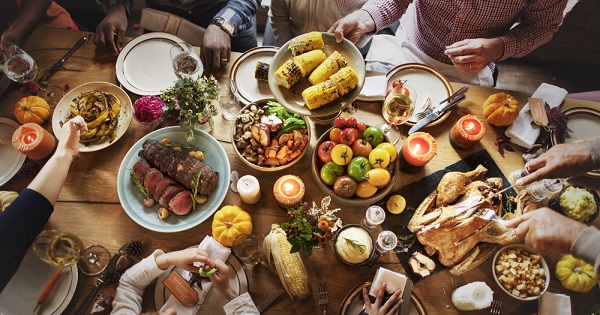Thanksgiving Tips for Heart Health

Americans love their Thanksgiving dinners.
After a big feast, however, their hearts may feel a little differently.
The traditional turkey-day feast, replete with fatty, high-cholesterol, high-fat, and starchy foods like drumsticks, mashed potatoes, gravy and stuffing, is generally anything but heart-healthy.
But a little careful planning and portion management can allow you to enjoy your holiday meal without damaging your cardiovascular health in the process.
"In general, we say - enjoy your holiday meal with your family and friends, but make a point of not overeating" says Dr. James Stein, a cardiologist and Director of Preventive Cardiology at UW Health. “We have a month and a half of holidays, so the effects of overeating can really add up. Try to limit yourself to one serving. If you take a break after you eat a plateful, you likely will be full and not want seconds. You will sleep better and feel better the next day. Also, limit alcohol to one drink to prevent heart rhythm problems and overeating.”
It's possible - in fact, even likely - for the average person to rack up 2,000 calories in a single Thanksgiving sitting. For those of you scoring at home, that's the recommended number of calories for most adults for an entire day.
Here's a breakdown of turkey day's goodies:
- Not surprisingly, vegetables are the heart-healthiest part of the big Thanksgiving meal. Items like green beans, carrots, squash, and sweet potatoes balance their calories with plenty of heart-helpful vitamins and minerals.
- The worst part for your heart? It's the gravy. Typically made from the high-fat, high-calorie greasy drippings of the cooked bird, gravy is very high in saturated fat, which can raise cholesterol. It's been shown that a single high-fat meal can damage your arteries. But again, portion size is the key. "You can say gravy is high in fat, but the question is, how much did you have? Would a little bit do the trick? Why drench everything in gravy when a taste will do? Look at the overall meal and ask how it was balanced." Stein recommends.
- If the cranberry relish is homemade, using real cranberries, it can be heart-healthy. If it's out of a can, it's likely to be very high in simple sugars which can worsen diabetes and raise triglcyerides (fats) in the blood.
- If you're nibbling on dark meat or, far worse, the turkey skin, you're ingesting even higher levels of saturated fat and cholesterol. Try not to do that, or just take a taste and stop. Of course, adjusting your Thanksgiving recipes can make a big difference in their relative heart-healthiness.
"Could you use yogurt instead of sour cream, or maybe just egg whites?" asks Dr. Stein. Using light butters and margarine also can lower levels of saturated fat without sacrificing much taste. Even gravy, Thanksgiving's highest fat recipe, can be made in a healthier way.
If you plan to try the healthy route and you're not doing the cooking, Stein suggests that half of your Thanksgiving plate should consist of fruit and vegetables, with a fourth devoted to light turkey meat (minimum gravy), and a fourth to starches like sweet potatoes or whole grain bread. If you're having pie, limit the serving size to a small taste – and again resist that second helping.
Lest you feel that rain's falling on your Thanksgiving parade, Stein is quick to point out that nutrition is a long-term issue. In other words, one meal doesn't create permanent damage to your heart and arteries – but the holiday season can. A great strategy is to get in a long session of exercise on Thanksgiving day before the feast.
"It's a holiday meal and we know that people can and should enjoy it," he says. "There's a reason we've never held a cholesterol screening clinic on the Friday after Thanksgiving."
Story Credit: https://www.uwhealth.org/health-wellness/thanksgiving-tips-for-heart-health/51473


